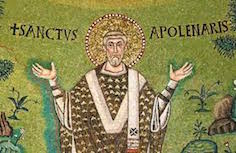 Early accounts report that St. Apollinaris was born in Antioch and became a disciple of St. Peter. He was ordained by the Prince of the Apostles himself and sent as a missionary Bishop to Ravena during the reign of the Emperor Claudius (who ruled from 41 to 54). Apollinaris won great acclaim in the Church and became a model for her Martyrs.
Early accounts report that St. Apollinaris was born in Antioch and became a disciple of St. Peter. He was ordained by the Prince of the Apostles himself and sent as a missionary Bishop to Ravena during the reign of the Emperor Claudius (who ruled from 41 to 54). Apollinaris won great acclaim in the Church and became a model for her Martyrs.According to a legend, stemming from the 7th century, Apollinaris cured and official’s wife, resulting in the couple’s conversion, cured a man who could not speak, and gained a good many adherents to the faith. As a result, he was scourged and sent away from Ravena. Going to Bologna, he converted the family of Rufinius, a patrician, leading to his ouster from that city. The holy man went to preach in Dalmatia and ended up being sent away from there also.
St. Apollinaris returned to his See on three separate occasions, and each time he was subjected to torture and cast out again. On his fourth return, he was forced to go into hiding from the Emperor Vespasian (69-79), who issued a decree banishing all Christians. Ultimately, the Saint was recognized by a mob at Classis, a suburb of Ravena, beaten, and left for dead.
St. Peter Chrysologus (d. 450), one of the Saint’s successors at Ravena, called him a Martyr and said that God did not permit the persecutors to take his life. So Apollinaris may have been a Martyr solely by the torments he endured for the Lord.
PRAYER: Lord, direct Your faithful in the way of eternal salvation, which St. Apollinaris Your Bishop pointed out by both his teaching and his martyrdom. By his intercession enable us to persevere in Your commandments so that we may merit to be crowned with him. Amen.
